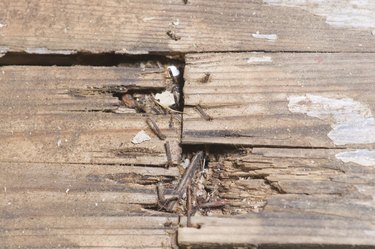A well-kept backyard, and the indoor-outdoor lifestyle it enables, is definitely something that's worth investing a bit of time and effort into. That's only partly because of aesthetics: Keeping up on your yardwork and maintenance brings practical advantages like helping your home maintain its value and even deterring insect pests. Here are a few simple, common-sense ideas that can help keep bugs from bugging you or infesting your property.

Video of the Day
1. Don't Have Standing Water
Mosquitoes aren't just one of the most annoying insect pests: Their blood-sucking lifestyle also makes them a dangerous spreader of diseases. Mosquitoes lay their eggs in still, standing water, so eliminating that from your backyard (as much as possible) plays a big role in limiting their population. Check your yard after a rain, and watch for places where water pools in toys, gutters or hardscaping, and either drain them or fill them in. Replace the water frequently in bird baths, and make sure it's aerated in water features.
Video of the Day
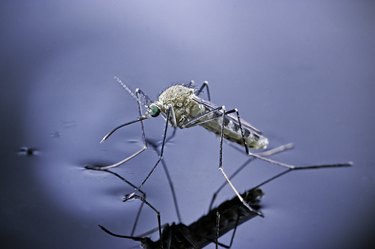
2. Keep Your Grill Clean
One simple rule to observe when pest-proofing your property is that if you provide a source of concentrated nutrients sitting around, pests will find and exploit it. One place where calories collect is your grill, where fat, protein-rich juices and sweet, sticky barbecue sauces accumulate and provide an insect smorgasbord. In this case, good bug-proofing coincides with good hygiene: Keep your grill clean, including (and especially) any drip trays, grease collectors and flame deflectors.

3. Build Bug Traps
Actively trapping troublesome pests can go a long way toward keeping your yard bug-free, as well. Commercial bug traps are available, but you can whip up a DIY version with just an empty juice or soda bottle and some tape. Cut the sloped shoulders and top from the bottle, and then invert it so it makes a funnel entry to the rest of the bottle. Tape it in place, and fill the bottle with an appropriate bait: Sugary liquids work for wasps and other pests; or add yeast to the mix to trap mosquitoes (they're attracted to the carbon dioxide the yeast produces). The bugs fly in but can't fly out, and eventually drown.
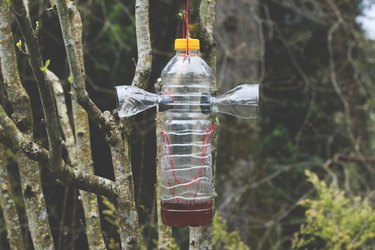
4. Grow Insect-Repelling Plants
A lot of common garden plants have well-observed insect-repelling abilities. Popular herbs including mint, catnip and lavender, for example, are all known to deter mosquitoes. So does lemongrass, which is actually the source of the citronella oil that's used in your candles and torches. The six-foot clumps of lemongrass make a beautiful decorative element around your deck and yard, aside from their insect-repelling prowess. Marigolds are another decorative bug deterrent: Not only do mosquitoes dislike them, they'll deter numerous pests that might otherwise feast on your vegetable garden.

5. Keep Food Covered
Mosquitoes and other biting insects aren't the only ones to potentially view your yard as a lunch counter. If you think about all the things you put on the table during a backyard cookout — breads, vegetables, fruit, meat, sweet sodas and (ahem) fermented beverages — there's something there to appeal to just about every bug there is. To avoid clouds of opportunistic insects, keep them apart from the food. If serving in a mesh-sided gazebo isn't an option, you can find inexpensive screen covers for the individual options. The bugs will quickly lose interest and go somewhere else.

6. Provide Predator Habitat
One of the most natural and effective ways to control insect populations is by encouraging predators. Bats — and insect-eating birds, if bats creep you out — will happily take up residence in your yard if you build them a suitable house to live in, and can eat hundreds of insects in a day (or a night, in the bats' case). Mantises require little more than a few shrubs where they can hide, and lay their eggs. Finally, break the habit of automatically sweeping away spiders and their webs. They're very efficient at keeping insect populations down, if you leave them to their work.

7. Discourage Wild Animals
A half-grown fawn in your backyard at daybreak is a breath-catching sight, but giving wild creatures the run of your yard is a bad idea. Aside from their tendency to treat your gardens (and occasionally your pets) as a snack bar, wild animals can bring insect pests along with them. Deer, for example, are hosts to the ticks that cause Lyme disease. To keep them away, invest in stout fencing, choose deer-resistant plants where possible, and secure your trash to discourage flea-bearing rats, mice and raccoons.
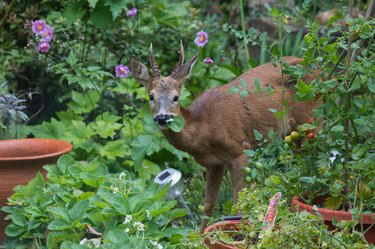
8. Treat Your Pets Regularly
Don't neglect the animals who are supposed to be in your yard, either. Treating your dogs and any outdoor cats against fleas and ticks is essential to keeping your property free of those maddening (and medically dangerous) pests. Your vet can recommend a treatment plan that's appropriate to your area. If your pets have outdoor feeders, those will be a magnet both for insects and for the wild animals who host them. To minimize their impact, feed your pets at designated times, empty the bowls when they're not in use and clean them regularly.

9. Keep Things Neat
Removing potential insect habitat is another key part of pest prevention. This simply boils down to keeping your yard neat and well-maintained. When leaves or branches blow down after a storm, or when you have the usual autumn deluge of leaves, clean them up. Keep your shrubs trimmed neatly and your lawn mowed, so pests that thrive in overgrown areas – like ticks and fleas – stay away. Just be aware that some beneficial insects require habitat too, and you may need to designate specific spots and types of habitat to encourage them.
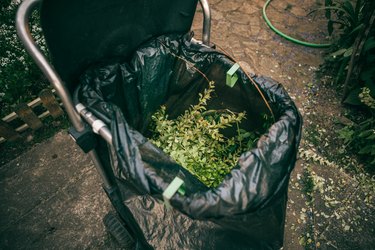
10. Keep Up on Maintenance
When you think about potential insect habitat around your yard, don't neglect the structures. Your home, deck and any sheds or garages can also provide potential homes (or points of entry) for insect pests. Many insects are attracted to rot, for example, so decaying boards on your deck, wood siding or fascia should be dealt with as quickly as possible. Cracks and seams should be sealed with caulking. Vents, such as the one for your dryer or a water heater, should have screens to prevent creepy-crawlies from entering and setting up housekeeping.
